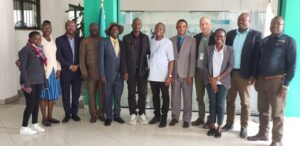9th to 11th May 2023 – In order to draw a clearer picture of green urban development, the Global Green Growth Institute (GGGI) Uganda organized a knowledge exchange mission for the mayors and senior urban planners of Arua, Gulu, Mbarara and Jinja, secondary cities, and the government officials of Ethiopia, from May 9 to May 11, 2023. The aim was to learn from Ethiopia’s green development experience in housing, transport and industry.
Over the past three years of the project, GGGI has supported these cities to achieve their green growth ambitions under the ‘Greening Uganda’s Urbanisation and Industrialisation Project’, funded by the European Union. This has been done through the development of green physical development plans, green industrial guidelines, infrastructure investment plans and bankable projects for their industrial sites.
According to the Uganda National Bureau of Statistics, Population Census held in 2017, Uganda’s rate of urbanization is 5.2 percent per annum. It is estimated that half of the country’s population will be living in urban areas by 2050. In order to improve the availability of infrastructure and facilities for industry and other commercial endeavors, to create high-value jobs and increase the productivity of its citizens in 2020, the government of Uganda approved the phased creation of fifteen secondary cities including Gulu, Arua, Mbarara and Jinja. Despite this, Uganda’s urban growth has not generated sufficient jobs, is unplanned, polluted, unsafe and sprawling. Uganda’s cities are low-density, exhibit multi-nodal networks of settlements, have pervasive socio-spatial segregation, and have a mismatch between where people live and work. There is an isolated concentration of poverty, severed from economic opportunities, and under-investment in public infrastructure. These make our urban centers a costly business environment.
Why a learning mission to Ethiopia?
With a growth rate of 6.3 percent in 2020/21, Ethiopia has the fastest-growing economy in the region. This growth is attributed to capital accumulation, particularly investments in public infrastructure. Both urban and rural areas have experienced a reduction in poverty as a result of consistent economic growth. In fact, the population living below the national poverty line decreased from 30% in 2011 to 24% in 2016. Being an African country with considerable success in city transformation, Ethiopia was the ideal country for a bench-matching mission by Ugandan urban delegates.

Ugandan delegation with GGGI Ethiopia.
Various meetings with stakeholders were conducted over the three-day mission. Discussions were held on traffic management, city beautification, waste management, BRT system, land allocation, industrial park management, affordable housing construction and financing, as well as building control practices. The Ethiopian and Uganda officials shared the challenges they face, proposed solutions and the successes achieved. The Ugandan delegation also had the honor of attending the launch of Ethiopia’s Long-Term Low Emission and Climate Resilient Development Strategy (LT-LEDS). The strategy is to lead Ethiopia towards a green growth path through ideal interventions ranging from financing mechanisms to governance, to achieve net-zero carbon emissions by 2050.
In addition to the meetings, site visits were organized to see the implemented green growth strategies in action. The visits are categorized under the themes of city beautification (Friendship Square and Entoto Park), transport (The Addis Ababa Light Rail Transport system and the city underground parking at Meskel Square), housing (Koye Feche Condominium Site) and industry (H.H Engineering and Ahabu Marble). The visits presented an opportunity to learn from the technical teams how these sites/facilities are operated, the challenges faced and the impact they have had on the communities.

Operation and control room of the Addis Light Rail Transport system
Two key lessons from this mission were first, the critical role played by the government, not only in bringing all stakeholders together but also, in championing the green development agenda through policies and financial support. Secondly, is a need for people-centered approaches to the design and management of projects to register impactful results.
GGGI Uganda would like to acknowledge and applaud GGGI Ethiopia for the significant role played towards the success of this mission.
The author is Hilda Nankya a Senior Assistant-Urban Development at Global Green Growth Institute Uganda Office.